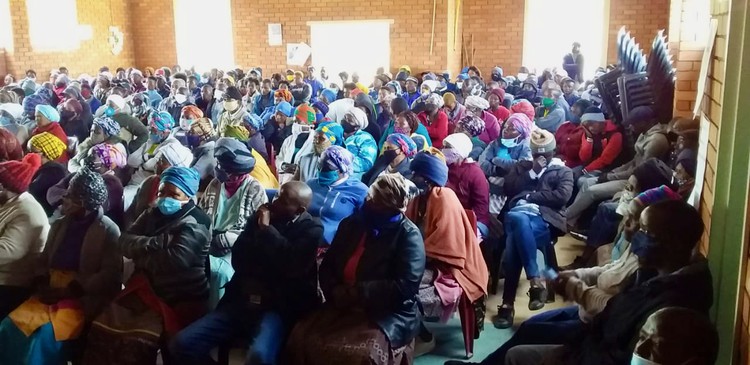
11 September 2020
Villagers meet after three suspected criminals were killed by vigilantes in the Eastern Cape town of Cacadu. Photo: Nombulelo Damba-Hendrik
Three men were beaten to death and their bodies set alight by Rhwantsana villagers on Wednesday, near Cacadu, formerly known as Lady Frere. The men, aged between 25 and 30, were said to have confessed to murder, according to community members. They were interrogated before they were killed.
Provincial police commissioner Lieutenant-General Lizwe Ntshinga strongly condemned the killings.
The vigilantism come after an 85-year-old woman, Notest Lolo, was found dead inside her house on Friday, 4 September. Her daughter, Phathiswa, said she was living alone in a large house. Her children had been trying to reach her since 28 August.
“At first we thought she had a network problem, but after three days we started to panic,” said Phathiswa.
Her sister called neighbours to check on their mother. They found her home padlocked. When they broke in they found her body.
“The blood was already dry. Those who saw her said the murderers tried to cut her neck,” said Phathiswa.
The villagers say that since 2016, nine people have been murdered in their village; most victims were elderly people or young girls. Ward councillor Tozma Mrweni confirmed this.
During the lockdown period, three people were murdered. Police have made no arrests.
Mrwebi said, “Before the death of the old woman, a young girl was raped and killed. No arrest was made.”
Ward committee member Bukiwe Mgwebi said the only police stations are at Queenstown (55km away) and Cofimvaba (40km away), and the village, together with six other villages in ward 1, fall under the Bolotho police station, which is just outside Cofimvaba.
“When we call the police they do not come and for years we have been asking for a mobile police station with no luck. Even this January, we sent a letter asking for a mobile police station,” said Mgwebi.
Before the killings on Wednesday, residents met with police to complain about the lack of policing.
“In that meeting young people told the police that they know the perpetrators and if police can promise to arrest them the same day they will name them. And we believe there were enough police to make the arrests that day,” said Mgwebi. She said there had been nine officers at the meeting.
She said the officer, who addressed them on behalf of the Bolotho police, insulted the villagers and said they were talking nonsense (“intswaqane”).
The meeting then turned sour.
“The young people demanded an apology but the officer refused to apologise and they [police] marched out of our meeting. The young people told them they will look for the criminals, but police ignored them,” she said.
On Thursday morning, villagers went hunting for a fourth suspect.
Police confirmed that three cases of murder were opened. Our other questions went unanswered.